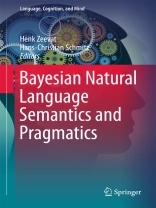The contributions in this volume focus on the Bayesian interpretation of natural languages, which is widely used in areas of artificial intelligence, cognitive science, and computational linguistics. This is the first volume to take up topics in Bayesian Natural Language Interpretation and make proposals based on information theory, probability theory, and related fields. The methodologies offered here extend to the target semantic and pragmatic analyses of computational natural language interpretation. Bayesian approaches to natural language semantics and pragmatics are based on methods from signal processing and the causal Bayesian models pioneered by especially Pearl. In signal processing, the Bayesian method finds the most probable interpretation by finding the one that maximizes the product of the prior probability and the likelihood of the interpretation. It thus stresses the importance of a production model for interpretation as in Grice’s contributions to pragmatics or in interpretation by abduction.
قائمة المحتويات
Preface by Henk Zeevat & Hans-Christian Schmitz.- 1. Perspectives on Bayesian Natural Language Semantics and Pragmatics by Henk Zeevat.- 2. Causal Bayesian Networks, Signalling Games and Implicature of `More than n’ by Anton Benz.- 3. Measurement-Theoretic Foundations of Logic for Better Questions and Answers by Satoru Suzuki.- 4. Conditionals, Conditional Probabilities, and Conditionalization by Stefan Kaufmann.- 5. On the Probabilistic Notion of Causality: Models and Metalanguages by Christian Wurm.- 6. Shannon vs. Chomsky: Brain Potentials and the Syntax-Semantics Distinction by Mathias Winther Madsen.- 7. Orthogonality and Presuppositions. A Bayesian Perspective by Jacques Jayez.- 8. Layered Meanings and Bayesian Argumentation: The Case of Exclusives by Grégoire Winterstein.- 9. Variations on a Bayesian Theme: Comparing Bayesian Models of Referential Reasoning by Ciyang Qing and Michael Franke.- 10. Towards a Probabilistic Semantics for Vague Adjectives by Peter Sutton.












